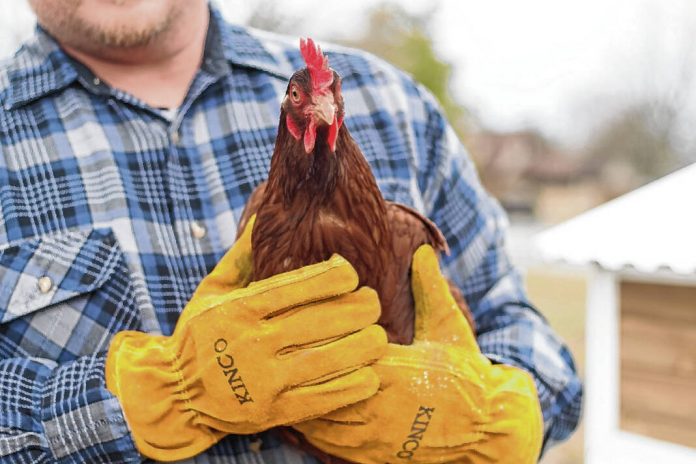Chickens or no chickens? That is the question Whiteland Town Council members will have to answer on Tuesday.
A proposal to change Whiteland’s zoning codes to allow residents to keep a small flock of chickens lost steam after receiving an unfavorable recommendation by the Whiteland Advisory Plan Commission on May 2. It now heads to the town council for a vote.
The four plan commission members present at the May 2 meeting voted unanimously for the recommendation, citing some issues they had with changing the ordinance now, said Carmen Young, Whiteland’s acting town manager.
The chicken debate stemmed from a plea from resident Shawn Butler to allow him to keep his chickens. After owning them for a year, he was notified by the town that he is not allowed to have chickens.
Currently, two ordinances in the Whiteland town code prohibit residents from owning chickens on residential-zoned lots. The town considers owning a small poultry flock a “nuisance” if it is within 200 feet or less from another person’s house, according to town code. A third part of the code also limits households to three pets.
Butler had originally asked the Whiteland Town Council in February about changing the ordinance, and three out of five members said they would be in favor of it. A month later, an ordinance drafted to change the town code came to the council. But after a heated debate among council members, they decided to send it off to the plan commission first.
The zoning amendment ordinance proposed to the plan commission would allow chicken ownership within town limits at single-family or two-family dwellings under certain circumstances and with conditions. Residents would need to obtain a permit and would have to follow all provisions of the ordinance or risk having the permit revoked. Permits would come from the Board of Zoning Appeals, with a public hearing to allow neighbors to speak.
Regulations are included, such as requiring no more than six hens per household, and restrictions that coops could not be larger than 120 feet in area or taller than 10 feet. Waste would have to be removed on a regular basis and the smell of the waste should not reach beyond the property line.
Homeowners associations, covenants or deed restrictions regarding chicken keeping would still be enforceable under the ordinance, as the ordinance does not supersede private agreements.
Young said she added more meat and clarity to the original draft of the ordinance before it went to the commission. She looked at about 20 different municipalities that allow backyard chickens and copied sections from those ordinances that would add more protection for property owners, neighbors and chickens.
Ultimately, the commission members present were not on board with changing the ordinance now.
One reason is because the effort stems from a reaction to someone breaking town laws. The town has paused its code enforcement against Butler, awaiting a decision on if the code would be changed, Young said.
Plan commission members worried allowing chickens now would set a precedent that anyone in town could break the rules, and then come to the town council to ask for codes to be changed so they won’t be cited.
“Their main thing is they just didn’t want to set a precedent to residents that if you’re breaking the rule, it’s OK, and we’ll just change them for you,” Young said.
Commission members were not opposed to allowing backyard chickens at some point, just not in this process. They asked Young to again pursue Butler’s violation, and then come back at a later date once that issue rests.
The town council is set to consider the chicken ordinance on Tuesday, now with the plan commission’s recommendation. They have a few choices on what to do with the ordinance.
They can hold a vote on it as is, and vote it down, which would be in line with the unfavorable recommendation. Alternatively, they could ignore the recommendation and pass it into law anyway.
If they aren’t happy with changes to the ordinance, council members could make their own changes and send it back to the commission.
They could also take no action. If action is not taken within 90 days, the ordinance with the recommendation is negated until it comes up again, Young said.





